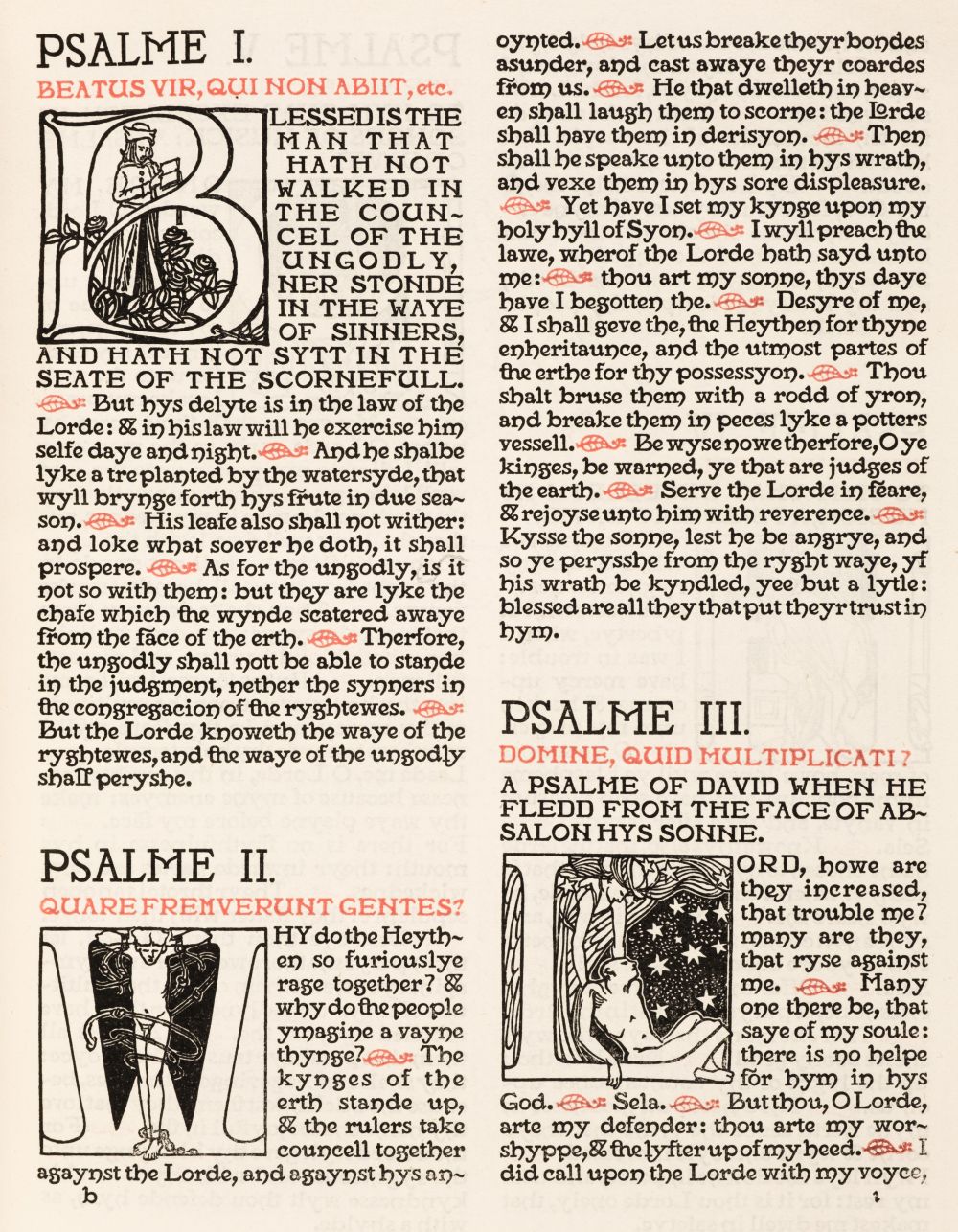PSALTER, from a Bible, in French, ILLUMINATED MANUSCRIPT ON VELLUM
PSALTER, from a Bible, in French, ILLUMINATED MANUSCRIPT ON VELLUM [?Paris, early 14th century]350 x 260mm. 27 leaves: written in brown ink in a gothic bookhand in two columns of 46 lines between four verticals and 47 horizontals ruled in grey, justification: 255 x 84 - 18 - 84 mm, lower prickings for verticals on most leaves, rubrics in red, numerous one- and two-line initials in gold on divided grounds of blue and pink patterned with white, EIGHT LARGE INITIALS with staves of blue or pink and grounds of the contrasting colour with foliate infills, two with dragon heads, on burnished gold, extending into partial BORDERS with ivy leaf or dragon head terminals, one with a hound chasing a rabbit (slight worming to margins of opening leaves, some loss of blue pigment from some leaves, stitching lost from two original repairs). 19th-century half vellum and marbled boards, red morocco lettering piece (slightly soiled). PROVENANCE: The Bible, from which the Psalter comes, was probably made in Paris in the early years of the 14th century for a lay patron of considerable wealth; most large vernacular Bibles were produced for aristocratic owners, some female. Bibles in French were not automatically associated with heresy, despite anxieties about the Cathars, but were seen as useful aids to Christian instruction. Francis Ferrand Foljambe: his crested stamp on f.1. CONTENT: The Psalter, in French, with the opening words of each Psalm, and each division of Ps 118, repeated in Latin and written in red; the heading of Ps 106, which should have duplicated that of Ps 105, was omitted, presumably in error. Psalm 9 is divided after verse 19; Psalm 17 is divided after verse 25. The French text of Ps 1 opens 'Boin eures est li hons qui nala pas el conseil des felons'; Ps 150 closes 'Loes li en cloches bien sonnans loes le en cloches de iubilation tout esprit loes nostre seigneur', ff.1-27v. The Psalter, fundamental to the Christian liturgy and to private devotional practice, was the first book of the Bible to circulate in French prose. The original early 12th-century translation into Anglo-French, based on Jerome's Latin translation of the Hebrew Psalter, informed subsequent French versions on both sides of the Channel. In the present lot, the division of Psalm 9 follows the conventions of the Hebrew Psalter and not those of the Latin Vulgate, where the Psalter is taken from Jerome's translation from the Greek. The Anglo-French translation formed the basis of the Psalter in the first complete Bible in French, compiled and translated in the 13th century and so usually known as the Bible du XIIIe siècle . Debate continues over its origin and date: it was based on the text of the Latin Bible established in Paris in the first three decades of the 13th century and so cannot predate c.1220; the earliest surviving manuscripts date from the later 13th century but it has been argued that the text had been completed by about 1260. The success of the Paris Bible in making the complete Latin Vulgate widely available may have stimulated demand for a complete Bible in French to satisfy the growing numbers literate in the vernacular but not Latin. Perhaps fostered by the Dominican Order with its dual mission of lay instruction and scholarship, the Bible du XIIIe siècle is usually thought to have originated in Paris, although a case has been made for Orléans (see C. Sneddon, 'On the creation of the Old French Bible', Nottingham Mediaeval Studies , 46 (2002), pp.25-44, and 'The Bible du XIIIe siècle : its medieval public in the light of its manuscript tradition', The Bible and Medieval Culture , 1979, pp.127-40). Few complete copies of the Bible du XIIIe siècle survive, since the demand for the historical books of the Old Testament in French was rapidly better satisfied by the Bible historiale composed by Guiard des Moulins, canon of Aire in Artois, between 1291 and 1295. He translated and adapted parts of Peter Comestor's biblical history, the Historia sc
PSALTER, from a Bible, in French, ILLUMINATED MANUSCRIPT ON VELLUM
PSALTER, from a Bible, in French, ILLUMINATED MANUSCRIPT ON VELLUM [?Paris, early 14th century]350 x 260mm. 27 leaves: written in brown ink in a gothic bookhand in two columns of 46 lines between four verticals and 47 horizontals ruled in grey, justification: 255 x 84 - 18 - 84 mm, lower prickings for verticals on most leaves, rubrics in red, numerous one- and two-line initials in gold on divided grounds of blue and pink patterned with white, EIGHT LARGE INITIALS with staves of blue or pink and grounds of the contrasting colour with foliate infills, two with dragon heads, on burnished gold, extending into partial BORDERS with ivy leaf or dragon head terminals, one with a hound chasing a rabbit (slight worming to margins of opening leaves, some loss of blue pigment from some leaves, stitching lost from two original repairs). 19th-century half vellum and marbled boards, red morocco lettering piece (slightly soiled). PROVENANCE: The Bible, from which the Psalter comes, was probably made in Paris in the early years of the 14th century for a lay patron of considerable wealth; most large vernacular Bibles were produced for aristocratic owners, some female. Bibles in French were not automatically associated with heresy, despite anxieties about the Cathars, but were seen as useful aids to Christian instruction. Francis Ferrand Foljambe: his crested stamp on f.1. CONTENT: The Psalter, in French, with the opening words of each Psalm, and each division of Ps 118, repeated in Latin and written in red; the heading of Ps 106, which should have duplicated that of Ps 105, was omitted, presumably in error. Psalm 9 is divided after verse 19; Psalm 17 is divided after verse 25. The French text of Ps 1 opens 'Boin eures est li hons qui nala pas el conseil des felons'; Ps 150 closes 'Loes li en cloches bien sonnans loes le en cloches de iubilation tout esprit loes nostre seigneur', ff.1-27v. The Psalter, fundamental to the Christian liturgy and to private devotional practice, was the first book of the Bible to circulate in French prose. The original early 12th-century translation into Anglo-French, based on Jerome's Latin translation of the Hebrew Psalter, informed subsequent French versions on both sides of the Channel. In the present lot, the division of Psalm 9 follows the conventions of the Hebrew Psalter and not those of the Latin Vulgate, where the Psalter is taken from Jerome's translation from the Greek. The Anglo-French translation formed the basis of the Psalter in the first complete Bible in French, compiled and translated in the 13th century and so usually known as the Bible du XIIIe siècle . Debate continues over its origin and date: it was based on the text of the Latin Bible established in Paris in the first three decades of the 13th century and so cannot predate c.1220; the earliest surviving manuscripts date from the later 13th century but it has been argued that the text had been completed by about 1260. The success of the Paris Bible in making the complete Latin Vulgate widely available may have stimulated demand for a complete Bible in French to satisfy the growing numbers literate in the vernacular but not Latin. Perhaps fostered by the Dominican Order with its dual mission of lay instruction and scholarship, the Bible du XIIIe siècle is usually thought to have originated in Paris, although a case has been made for Orléans (see C. Sneddon, 'On the creation of the Old French Bible', Nottingham Mediaeval Studies , 46 (2002), pp.25-44, and 'The Bible du XIIIe siècle : its medieval public in the light of its manuscript tradition', The Bible and Medieval Culture , 1979, pp.127-40). Few complete copies of the Bible du XIIIe siècle survive, since the demand for the historical books of the Old Testament in French was rapidly better satisfied by the Bible historiale composed by Guiard des Moulins, canon of Aire in Artois, between 1291 and 1295. He translated and adapted parts of Peter Comestor's biblical history, the Historia sc






.jpg?w=400)
.jpg?w=400)





Testen Sie LotSearch und seine Premium-Features 7 Tage - ohne Kosten!
Lassen Sie sich automatisch über neue Objekte in kommenden Auktionen benachrichtigen.
Suchauftrag anlegen